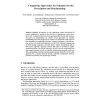Free Online Productivity Tools
i2Speak
i2Symbol
i2OCR
iTex2Img
iWeb2Print
iWeb2Shot
i2Type
iPdf2Split
iPdf2Merge
i2Bopomofo
i2Arabic
i2Style
i2Image
i2PDF
iLatex2Rtf
Sci2ools
138
click to vote
COOPIS
2004
IEEE
2004
IEEE
Comparing Approaches for Semantic Service Description and Matchmaking
Matching descriptions of user requirements against descriptions of service capabilities is crucial for the discovery of appropriate services for a given task. To improve the precision of approaches that consider only syntactical aspects of matchmaking (e.g. UDDI) several approaches for semantic matchmaking have been proposed. We compare two approaches with respect to their potentials for matchmaking between semantic descriptions of geoinformation services. The State-based Approach uses the Web Ontology Language and the Rule Markup Language to describe inputs, outputs, preconditions and efn the Algebraic Approach, abstract data types are specified to capture domain knowledge. The specific data types used in a service model referred to these shared concepts. In order to make the specifications executable and to enable matchmaking a functional programming language (Haskell) is used in this approach. For a scenario from the domain of disaster management, both approaches are tested for one ...
Related Content
| Added | 20 Aug 2010 |
| Updated | 20 Aug 2010 |
| Type | Conference |
| Year | 2004 |
| Where | COOPIS |
| Authors | Sven Schade, Arnd Sahlmann, Michael Lutz, Florian Probst, Werner Kuhn |
Comments (0)

